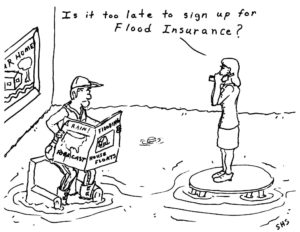At the STEPS Centre Symposium on the Politics of Uncertainty, Susan Erikson (Simon Fraser) and Rebecca Elliott (LSE) presented fascinating cases for the insurance theme, which was part of the finance cluster. Here are two snapshots:
Financing Emergency Pandemics
In July 2020, 26 investors in the Pandemic Emergency Financing Facility (PEF) are set to reap a handsome financial reward. Their investment in bonds designed to provide emergency funds for countries ravaged by pandemic diseases such as Ebola, will have yielded upwards of an 11 per cent annual return. Emergency payouts are released to the countries participating in the scheme only once data threshold triggers, known as ‘activation criteria’, are met. On this basis, money is released to the affected countries gradually as the death count rises.
The data for the bond and its payout are collected by enumerators, who are employed by contracted third-party calculation agents and conduct surveys in impossible conditions for a precarious wage. The contracts drawn up between the World Bank, World Health Organisation and private-sector partners, including reinsurance companies, guarantee these extraordinary returns for investors, providing that data thresholds are not met and payout claims do not impinge.
Natural disaster insurance in New York City
In the very different setting of New York City, a different process of disaster payout is taking place. In the wake of Hurricane Sandy in 2012, it was decided that New York City flood rate insurance maps would be updated for the first time in 30 years. These maps set new premiums for household insurance across the city, where more residents live in high-risk flood zones than any city in the country. They instil fear and anxiety in New Yorkers who worry about being priced out of their neighbourhood. Drawing on shared emotional experience, residents have even mobilised campaigns to influence the future of the insurance programme. This has thrown often disparate communities together in political solidarity against the tools of the government insurance programme ostensibly designed to protect them.
Taming uncertainty, managing risk
The discussion at the symposium focused on the power and politics flowing through technical models, the way that perceptions of risk shape different logics of practice and the uneven nature of responsibility for risk and uncertainty when financial systems mediate or even create such burdens. I was particularly receptive to these arguments, as just the week before we had hosted a one-day conference on ‘Risk and Uncertainty in the Anthropocene’ for CUSP at Goldsmiths, University of London, at which we explored the mediation and distribution of risk and uncertainty in political theory, geopolitics, scenarios analysis, finance, knowledge structures and algorithms across disciplines.
Much of the effort in the financial world in dealing with uncertainty is exerted in repackaging or ‘taming’ it as its more manageable relation, as risk. In the case of the PEF, speculative global health finance has set the opaque terms of risk management, embedding conditions that assuage the investors’ wager rather than focusing first and foremost on health needs. In New York, the production of manageable risk in the new insurance maps has provoked resistance among emergent collectives in the risk pool, whose sense of risk and uncertainty is mediated, and misled, by insurance tools.

In both cases, particular local logics of risk interpretation and recording determine or respond to risk at other scales. Elliott revealed how New York residents are thrown together in ‘communities of fate’, and begin to coordinate the political uncertainties of flood risk and how it is governed. Erikson demonstrated the contingency at the heart of the PEF, which turns on the collection and management of data ‘on the ground’, and how such processes might be influenced by the interests of either receiving countries or investors keenly waiting on their reward. These very different struggles and their outcomes are revealing of whose risk counts, who is made responsible and which uncertainties can be made profitable.
Excavating politics from technical models and market devices
Through financial risk management, maps and surveys become socio-technical market devices. They form part of, broadly considered, models that mediate expectations and that have disciplining effects. Leigh Johnson, the Insurance theme lead at the STEPS symposium, pointed out that models are often more important for their present implications or decision-making effects than for producing “accurate” knowledge about the future. The fixity of risk as absolutely quantifiable uncertainty dissolves, because it’s really about who has market or rhetorical power to get their vision across. Uncertainty, too, is not some naturally given state of the world, it is socially generated, through expectational structures and narratives encountering each other, as Richard Bronk outlined early in the Symposium.
Equally, models cannot be demonised as inherently politically regressive means to envisage and discipline uncertainty. Excavating the often subterranean, concealed politics that flow through technical models and market devices requires asking some fundamental questions about accountability and responsibility. It may be that some models – such as those presently offered by capital markets – will never be appropriate for coping with uncertainty that should rather be dealt with by collective social security systems. The politics of uncertainty might throw together some surprising coalitions, as it has in the New York risk pool, but the solidarity of the bondholder with the Ebola victim is clearly false.
The question, then, is how to develop and nurture institutions that tackle uncertainty, guided by deeper principles of democracy, equality and solidarity than our financial system can currently offer. This call becomes even more pressing in the ‘Anthropocene era’, when we have to resist the call to universalise responsibility for increasing ecological catastrophe – “we’re all to blame!” – and seek out a politics of uncertainty that recognises the relationships of inequality that have shaped the existing distribution of responsibility.
This is one of a series of blog posts by participants following the STEPS symposium The Politics of Uncertainty: Practical Challenges for Transformative Action.
About the author
Nick Taylor is a political economist with research interests in the history of the welfare state, history of economic thought and international political economy. He is Research Fellow for the ESRC-sponsored Centre for the Understanding of Sustainable Prosperity (CUSP), working with Dr Will Davies in the Political Economy Research Centre (PERC) at Goldsmiths.

Uncertainties can make it hard to plan ahead. But recognising them can help to reveal new questions and choices. What kinds of uncertainty are there, why do they matter for sustainability, and what ideas, approaches and methods can help us to respond to them?
Find out more about our theme for 2019 on our Uncertainty theme page.
